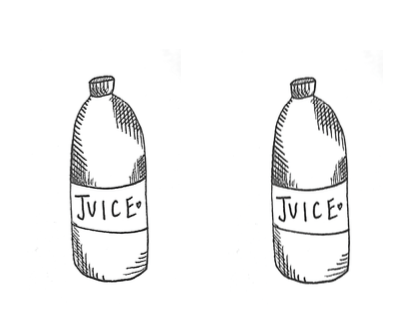In Denver, Colo., a gentle fusion of smells floats about the popular restaurant, Vital Root, in the afternoon. They swirl about the outside patio, which is bordered by walls with elevated tiers of growing succulents and herbs. A black mesh netting hangs above it all. I sat beneath it for the first time two summers ago. I looked around. Two women in matching black sunglasses, flare gun red tank tops, and yoga pants talked about their mutual friend’s most recent breakup. A man in his twenties, sporting a bowl cut with a skin fade and ear gauges, arrived to meet an old friend with a skateboard tucked under the arm of his black hoodie. I caught occasional snippets of conversation. “…I’m trying to nourish my third eye through clean eating.”

This experience is not specific to Denver; it might as well have happened at the Juice Box or B-Natural Cafe in New Haven. Aesthetically pleasing, trendy, health-oriented restaurants like Vital Root, often born of gentrification, service a growing class of upscale urbanites interested in “biohacking,” or a form of D.I.Y. nutrigenomics in which citizen-scientists attempt to “hack” and improve their bodies’ systems. Frankie Maderia, a dietitian in Wallingford, Conn., is observing a change in New Haven restaurants. She explains that she hasn’t “noticed anything extremely out of the ordinary” but that “there are more plant based food options, gluten free foods, juice bars and organic coffee shops.”
Vital Root’s menu offers “globally influenced, health-conscious eats,” like avocado toast, quinoa pancakes, kale salad, and Bulletproof Coffee, which usually includes grass-fed butter and octane oil that is high in fatty acids. Customers can enjoy “an ultra-stylish all-day counter spot with 2 patios.” Similarly, its sister restaurant, Root Down, is self-described as “an artful, high-energy venue for creative American small plates.” Their websites emphasize the organic, locally sourced, sustainable, and non-GMO aspects of their food. Some frustrated Yelp reviewers, like Cara K., affirm that the “portion size on their dishes are so small and expensive” and that “it was a BIG waste of money.” But ‘elite’ reviewer Adam D. promises that despite being “in the vanguard with the gentrification of Denver,” Root Down is a place “seamlessly incorporated into the Highland neighborhood,” a place where you could, amidst “chic decor,” “impress your date and not be in debt after.”
Before that summer afternoon, I’d never seen so many people pay more to eat less. Denver’s Root restaurants charge anywhere from $7.50 to $13 for a piece of toast. They’re located in a neighborhood that was once called “Denver North,” but has since been transformed into a millennials’ haven called “the Highlands.”
Biohacking made a notable surge into the public consciousness circa 2014. Since then, it has attracted a host of individuals eager to promote their own longevity, or at least become better versions of their current selves. Nutritionist Maryanne Meade, based in Wallingford, Conn., notes that biohacking diets — high protein, high fat, low carb — “are another form of diets that go back to the 1920s.” She continued, “These diets pop up every couple of years.” However, the ideal of a prolonged and enhanced life isn’t new. Looking further back in history, the story of Tithonus, circa 460 B.C., describes a man who petitioned Zeus for immortality. The Epic of Gilgamesh, written in 2100 B.C., includes a search for the secret to eternal life.
As for biohacking, there’s no universal standard. Common nutritional practices include intermittent fasting and adhering to a variety of “natural” diets that include drinking “raw” unprocessed spring water and Bulletproof Coffee, and eating grass-fed beef, low-mercury fish, and veggies, all lathered in grass-fed butter. Some biohackers introduce drastic portion control to their own intermittent fasting practices such as the 5:2 split, which allows one to eat normally for five days before fasting entirely or consuming significantly reduced portions for the rest of the week. As Cara K. might point out, this sort of lifestyle is not accessible, affordable, or filling for many people. Milford, Conn. dietitian Kirsten Ackerman calls the diet “a privilege,” observing, “This model is only financially and practically feasible to those who have the time and energy to restrict their intake on purpose.” Like many of the nutritionists I spoke with, she stated that she would “absolutely never recommend intermittent fasting to a client” due to its unsustainable nature, detrimental effects on homeostasis, and lack of scientific support.
Regardless, biohacking maintains followings in neighborhoods like the Highlands through companies like Bulletproof 360 Inc., which sell supplements, drinks, and snack foods optimal for a biohacking diet, in addition to books such as the Bulletproof Diet that detail and promote the lifestyle. Brigitta Jansen, a Guilford, Conn. nutritionist, attributes the recent popularity of dietary biohacking trends to Bulletproof 360 Inc., noting that “Bulletproof started the trend.” Bulletproof, however, is just one of many businesses involved in the lucrative enterprise of dieting, weight loss, and other eating trends that dietitian Beth Rosen notes are part of a “$60 billion industry in the U.S.”
Despite biohacking’s purported advantages, such attempts at optimizing one’s health can have consequences, and many hungering for biohacking’s benefits will starve themselves of actual food in the process. In 2016, the National Center for Biotechnology Information stated that “malnutrition due to health fad diets may be an underestimated medical problem.” In one case, a man in his early seventies with signs of heart failure was admitted to a hospital, after following a diet solely comprising water, oil, and vegetables, which resulted from “an excessive preoccupation with health.” This excessive preoccupation is a concern for Meade, who worries that dietary obsessions can “precipitate or feed into eating disorders.” On a metabolic level, intermittent fasting as it is commonly practiced within biohacking can have catastrophic effects on one’s internal functions, inflicting significant and undue stress on one’s adrenal glands and unhealthy fluctuations in blood sugar levels via taxing restrictions that the human brain “is not wired to accommodate” long-term. As Maderia noted, “There is simply no evidence that many of these dietary methods will do anything for your health or longevity.”

At Vital Root, the waiter returned with my stir fry. I craned my neck, as if to confirm that there wasn’t a larger portion hidden behind a mint leaf or cashew. Staring at the small plate before me, I recalled my grandmother’s frequent mealtime imperative: make it all gone. Her childhood was spent in post-World War II Germany, looking for greens or roots, gleaning fields for scraps from leftover harvests to eat. The dandelion greens in this restaurant would be no stranger to her. My father’s stories of one of my grandfather’s friends searching for food also echoed in my head. One year, he had grown so underweight that the sunken notches behind his collar bones could hold palm nuts and rain water. For them, smaller meals were not a dietary choice, but rather an inevitable reality. Yet, here, it seemed as if restraint was a greater hallmark of security than consumption.
Biohackers aspire to perfect the human body through purportedly natural means — but their combination of nutritional practices are loosely anchored in biological truths and pseudo-science, flavored with off-brand spirituality that disguises its roots in economic elitism. By subscribing to the idea that you can buy control over your own body, biohackers ironically alter asceticism into something you can consume. However, the idea that the body can be optimized is acutely perilous for one’s physical wellbeing when put into effect. Despite marketing itself as an improved, yet more “natural” way of life, biohacking’s claims, science, and upscale status are manufactured.
Life, Hacked? was originally published in The Yale Herald on Medium, where people are continuing the conversation by highlighting and responding to this story.
